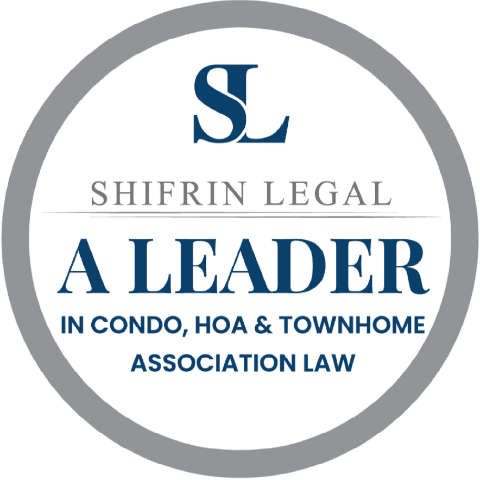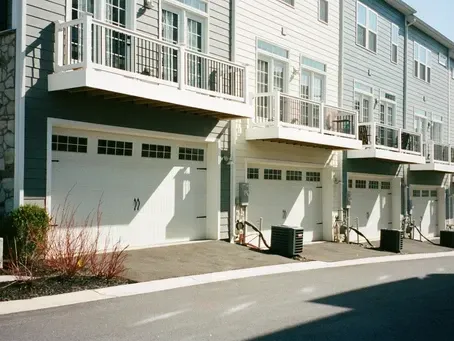Resources
BLOG

December 2025 Every year, condominium and homeowner association boards ask the same question: “Are we allowed to give holiday or appreciation gifts to our vendors or employees—or is that illegal?” The short answer in Illinois is this: modest, transparent gift-giving by private community associations is not illegal, and in many cases is perfectly appropriate when handled correctly. This article explains where the confusion comes from, what Illinois law actually says, and how boards can approach gift-giving in a responsible and defensible way. Why This Question Comes Up So Often Concerns about gift-giving usually arise when a board approves holiday gifts for vendors or staff, owners contribute to a “thank-you” or appreciation fund, someone circulates an article discussing public-sector ethics laws, a board member worries about fiduciary duties or misuse of funds. Most of the time, the concern is rooted in a misapplication of government ethics rules to private condominium/community associations. Condominium/Community Associations Are Private, Not Public Entities In Illinois, condominium/community associations are private, not-for-profit corporations governed by the Illinois Condominium Property Act, the Common Interest Community Association Act and the Not-For-Profit Corporation Act and funded by unit owner assessments, not taxpayer dollars. As a result, condominium/community associations are not subject to state ethics statutes governing public officials, gift bans applicable to government employees or rules restricting the use of public funds. Those laws apply to government bodies, not to private associations managing private property. Is There Any Illinois Law That Prohibits Holiday Gifts? No, there is no provision in the Illinois Condominium Property Act, the Common Interest Community Association Act or the Illinois Not-For-Profit Corporation Act that prohibits a condominium/community association from giving modest holiday or appreciation gifts to: Vendors Contractors On-site employees (such as janitors, engineers, or door staff) So long as the board acts within its authority and fiduciary obligations, gift-giving is not illegal. The Fiduciary Duty Analysis (What Really Matters) Illinois courts evaluate board decisions under the business judgment rule. Boards must: Act in good faith Act within their authority Make reasonable decisions in the best interests of the association Avoid self-dealing or personal enrichment A modest, transparent gift to vendors or staff—especially when: Approved at an open board meeting Properly documented Not directed to board members themselves will almost always satisfy this standard. Owner-Funded “Thank You” Collections Are Even Clearer Many associations collect voluntary owner contributions specifically designated as: “Holiday funds” “Thank you funds” “Vendor appreciation funds” When funds are: Voluntarily contributed by owners Clearly earmarked for appreciation purposes Distributed pursuant to board approval the board is simply administering owner-directed funds—not misusing assessments. This approach is common, transparent, and legally defensible. What About USPS Mail Carriers and Delivery Drivers? Some confusion arises because certain service providers, such as U.S. Postal Service employees, are subject to internal employer rules about what they may personally accept as gifts. That is: A matter of federal employment policy The responsibility of the individual recipient—not the association It does not make the association’s act of offering a modest holiday gift illegal under Illinois law. Best Practices for Associations While gift-giving is lawful, boards should follow best practices: ✔ Keep gifts modest and reasonable ✔ Avoid gifts to board members ✔ Approve distributions at an open board meeting ✔ Clearly document the source and purpose of funds ✔ Use voluntary owner contributions when possible ✔ Treat vendors consistently and fairly Transparency is the board’s strongest protection. The Bottom Line In Illinois, there is nothing illegal about a condominium/community association showing appreciation to its vendors and employees through modest holiday gifts—particularly when the process is transparent, reasonable, and properly approved. Confusion often stems from applying public-sector rules to private associations, where they simply do not belong. As with most governance issues, clarity, documentation, and common sense go a long way.

When faced with legal challenges, finding the right law firm to represent you is crucial. While larger firms often boast of having extensive resources and a wide range of services, smaller law firms offer distinct advantages that can significantly benefit their clients. Here are some of the key benefits of working with a smaller law firm: 1. Personalized Attention One of the most significant advantages of smaller law firms is the level of personalized attention they can provide. Clients are more likely to work directly with experienced attorneys rather than being passed off to junior associates. This hands-on approach ensures that your case is handled with the utmost care and attention to detail. 2. Strong Attorney-Client Relationships Smaller firms prioritize building strong relationships with their clients. This close-knit relationship fosters better communication and understanding, leading to more effective legal representation. Clients feel more comfortable discussing sensitive issues and trust that their attorney truly has their best interests at heart. 3. Cost-Effective Services Large law firms tend to have higher overhead costs, which are often passed on to clients in the form of higher fees. Smaller firms, with lower operating expenses, can offer more competitive pricing for their services. This makes quality legal representation more accessible to community associations operating on fixed budgets. 4. Flexibility and Agility Smaller law firms are generally more flexible and can adapt quickly to the unique needs of their clients. They are not bound by the same bureaucratic processes that often characterize larger firms, allowing them to respond more swiftly and creatively to legal issues. 5. Specialized Expertise While large firms may offer a broad range of services, smaller firms often focus on specific areas of law. This specialization means that attorneys at smaller firms are highly knowledgeable and experienced in their chosen fields, providing clients with expert representation. 6. Community Focus Smaller law firms are often deeply rooted in their local communities. This local focus enables them to understand the nuances of regional legal issues and offer insights that larger, multi-state firms may lack. Additionally, supporting a local firm helps bolster the community's economy. 7. Transparent and Accessible Clients of smaller law firms often experience better transparency and accessibility. With fewer clients to manage, attorneys can dedicate more time to explaining legal processes, keeping clients informed, and answering questions promptly. This level of transparency builds trust and confidence in the legal process. In conclusion, while larger law firms have their merits, the advantages of working with a smaller law firm should not be underestimated and can make the difference for your community association. From personalized attention and strong relationships to cost-effective services and specialized expertise, smaller firms offer a unique and highly beneficial legal experience that is unmatchable. Partnering with a smaller law firm offers the type of support and dedication necessary to guide your board through numerous legal challenges. The Advantages of a Monthly Retainer Program In addition to the benefits of working with a smaller law firm, opting for a monthly retainer program can provide significant advantages compared to the traditional hourly billing model. Here are some of the key benefits: 1. Predictable Costs One of the primary advantages of a monthly retainer program is cost predictability. Clients know exactly how much they will be paying each month, which helps with budgeting and financial planning. This eliminates the uncertainty and potential financial strain associated with hourly billing. 2. Consistent Legal Support A monthly retainer ensures that clients have consistent access to legal support whenever they need it. This ongoing relationship means that legal issues can be addressed promptly, without the delay of negotiating fees or waiting for availability. Clients can rely on their attorney to be available for regular consultations and urgent matters alike. 3. Stronger Relationship with Your Attorney With a retainer program, clients and attorneys develop a deeper, more collaborative relationship. This ongoing engagement allows the attorney to gain a more comprehensive understanding of the client's needs, business operations, and long-term goals. As a result, the attorney can provide more tailored and proactive advice. Counsel becomes an ad-hoc board member and joins the community leadership team. 4. Proactive Legal Strategy Rather than addressing legal issues as they arise, a retainer program enables a more proactive approach to legal strategy. Attorneys can work on preventing potential problems before they occur, advising on best practices, and ensuring compliance with relevant laws and regulations. This proactive support can save clients time, money, and stress in the long run. 5. Priority Access and Faster Response Times Clients on a retainer plan often receive priority access to their attorney's time and resources. This can result in faster response times and quicker resolutions to legal matters. Knowing that they are a priority client gives peace of mind and confidence in their legal representation. 6. Comprehensive Legal Coverage A retainer agreement typically covers a broad range of legal services, from routine consultations and document reviews to more complex matters. This comprehensive coverage ensures that clients receive the legal support they need, without worrying about additional costs for each service provided. 7. Cost-Effective in the Long Term While a monthly retainer may seem like a larger upfront commitment compared to hourly billing, it can be more cost-effective in the long term. Clients avoid unexpected, high hourly fees for urgent or complex issues. The predictable, monthly cost of a retainer can lead to overall savings, especially for clients who require frequent legal assistance. In summary, joining a monthly retainer program with a smaller law firm offers numerous benefits, including predictable costs, consistent legal support, and a stronger, more proactive attorney-client relationship. For clients seeking dedicated, high-quality legal representation, a retainer program provides the peace of mind and comprehensive coverage necessary to navigate legal challenges effectively.

The arrival of winter in Illinois brings the inevitable challenge of snow and ice removal, particularly for condominium associations responsible for maintaining common areas. The Snow Removal Service Liability Act (815 ILCS 675 et al. ), enacted to address liabilities associated with snow and ice removal, significantly affects condominium associations in the state. The Snow Removal Service Liability Act (SRSLA) in Illinois, established to encourage the clearing of snow and ice from properties, outlines crucial provisions regarding liability for snow removal contractors and the responsibilities of property owners or those responsible for property maintenance. The Snow Removal Service Liability Act (SRSLA) in Illinois, established to encourage the clearing of snow and ice from properties, outlines crucial provisions regarding liability for snow removal contractors and the responsibilities of property owners or those responsible for property maintenance. The SRSLA offers protection to condominium associations when they hire professional snow removal services. It shields associations from liabilities for personal injuries or property damage resulting from snow or ice removal on their premises, so long as they contract with licensed and insured snow removal services. This act recognizes that snow and ice removal are essential for public safety during winter but also understands the potential risks and liabilities involved. It provides a level of legal protection to condominium associations that engage qualified professionals for these services. Despite the protections provided by the SRSLA, condominium associations in Illinois should exercise diligence when hiring snow removal contractors. Ensuring that contractors are licensed, insured, and experienced in snow removal is crucial. Additionally, associations should clearly outline contractor responsibilities and limitations on liability between the parties in their contracts with snow removal services to mitigate potential issues. Associations should also establish clear protocols and timelines for snow removal to maintain the safety of residents and visitors. Regular inspections of common areas should be conducted to identify and address any hazardous snow or ice accumulations promptly. The Snow Removal Service Liability Act in Illinois serves as a protective measure for condominium associations when hiring professional snow removal services. By understanding the provisions of this act, acting prudently in contracting snow removal services, and having snow removal contracts reviewed by legal counsel, condominium associations can fulfill their obligations to maintain safe premises while minimizing potential liabilities associated with winter weather conditions. Condominium associations must stay updated with local laws and regulations, including the SRSLA, to ensure compliance and effective snow and ice removal practices, ultimately fostering a safer environment for all residents and visitors during the winter months in Illinois.

For as long as I have practiced law, management companies and boards developed a strong comfort level and preference for in-person annual elections. Elections occurred inside condominium association lobbies, party rooms, downstairs laundry rooms, even outside on common element yards and gazebos. The notice requirements for annual elections, the documents needed to carry them out (i.e. proxies, ballots, candidate nomination forms, etc.) and the general process for conducting them was second nature. That is until the pandemic descended upon the world in early 2020 and threw in-person elections and gatherings of any kind out the window.

1. My Association Pays for Everything Many people believe one of the biggest reasons to purchase property within a condominium or community association is because the association pays for all maintenance. That all roof work, landscaping, plumbing or electrical issues, painting, foundation repair, carpet replacement and driveway re-pavement is covered by the payment of one’s monthly assessment. This belief is incorrect. The scope and extent of maintenance covered by an association is set forth in the association’s declaration and bylaws. It varies from association to association and does not cover every single maintenance related malfunction. Be sure to carefully review your governing documents to fully understand what is your responsibility and that of your Association. 2. I Don’t Have to Pay Assessments in Certain Situations Another common misconception is that in certain situations owners are not obligated to pay monthly assessments. Some owners believe they have the right to withhold the payment of assessments if they dispute the way in which the board is spending association funds or if they abandon the unit altogether. Others believe they may withhold the payment of assessments to protest a particular board decision they disagree with. These are all incorrect. Owners may never withhold the payment of assessments under any circumstance. In fact, Section 18(o) of the Illinois Condominium Property Act specifically prohibits the board from forbearing the payment of assessments by any unit owner. Assessments are the oxygen all Associations require to function. 3. I Can Lease My Unit Whenever I Choose Some owners believe associations cannot control who they allow to live in their unit after all it is “their” property. That they have an absolute right to lease their unit to whomever they choose for however long they desire. This is a fallacy. Most associations have leasing controls in place to regulate the leasing of units within the association, usually in the Declaration but sometimes in the Rules and Regulations. Such restrictions usually dictate the number of units that may be leased at the same time, the length of each lease permitted, the order in which owners may lease, and may even outline eligibility requirements before leasing. It is critically important to review the governing documents to understand leasing within your association. 4. Board Meetings Permit Unregulated Owner Participation Certain association members believe open board meetings are intended to allow free owner participation throughout the meeting. Owners of this mindset view board meetings as open forum townhall style meeting in which they may interrupt, blurt out questions and receive immediate answers. This is wrong. Applicable law requires association board meetings to be open to unit owners to increase transparency. The purpose is to allow owners to observe the board in action while discussing important association topics and while making board decisions. Owners do not, however, have an absolute right to interrupt or to participate in board meetings. That said, most condominium association boards designate a specific time during which owners may ask questions and make comments. Section 1-40(b)(5) of the Illinois Common Interest Community Association Act requires boards to reserve a portion of their meeting for comments by the members; however, the duration and meeting order for the member comment period is solely decided by the board. 5. My Proxy is My Ballot Many owners operate under the misbelief that completing their proxy and mailing it in or delivering it to another owner serves as their actual vote. Technically this is incorrect. A proxy is not a ballot and a ballot is not a proxy. A proxy is a document that legally authorizes an agent to act on behalf of another party. It permits the person that completed the proxy to vote without being physically present at the meeting. Individuals that attend annual meetings with proxies should receive association issued ballots in exchange for each valid and properly issued proxy in their possession. They may then cast ballots at the annual election on behalf of those owners that provided them with their proxies. 6. The Board Cannot Levy a Special Assessment Without Membership Approval Tensions tend to run high whenever the phrase “special assessment” is mentioned in open board meetings or included in association newsletters and flyers. Some owners believe boards may not levy a special assessment of any kind without securing majority or supermajority approval. This is wrong. The purpose of the special assessment determines whether membership approval is required. A special assessment levied to raise funds to add or alter common element property requires two-thirds approval of all unit owners. For example, raising funds via special assessment to build a swimming pool requires advance membership approval. However, a special assessment levied for purposes of addressing deferred common element maintenance (e.g. replacing the boilers or tuckpointing the façade) does not require membership approval. Members do, however, have petition rights to overturn a special assessment as outlined in applicable law. 7. The Board Cannot Force me to Participate in a Tax Appeal Some condominium association unit owners believe the board cannot force them to participate in an association wide tax appeal. Upon receiving their share of the legal fee they dispute it on grounds they never voted to participate in the appeal. This is incorrect for condominium association members. Section 10(c) of the Illinois Condominium Property Act specifically authorizes the board, upon vote of two-thirds of the board members, to seek relief from any taxes and to charge and collect all expenses incurred as a common expense. 8. The Association Carries Property Insurance to Protect the Inside of my Unit Many condominium unit owners believe they do not need to purchase property insurance to protect the inside of their units because the association carries the necessary insurance. This is false. The Illinois Condominium Property Act requires condominium associations to carry property insurance that protects the common elements and the bare walls, floors and ceilings of the units. However, it does not require the association to insure improvements and betterments installed by the unit owners. Improvements and betterments refer to decorating, fixtures, furnishings, installed or added to the unit, electrical fixtures, appliances, air conditioning, heating equipment, water heaters, and built-in cabinets. Owners must secure proper insurance to protect these interior portions of property. 9. The Condominium Association Cannot Force me to Sell My Unit Understandably, many condominium association unit owners believe under no circumstances can they be forced to sell their unit. The decision to sell their unit is theirs and theirs alone to make. This is inaccurate. Section 15 of the Illinois Condominium Property Act requires owners to fully cooperate in executing documents to sell their unit if at least seventy-five percent of unit owners affirmatively vote at a unit owner meeting to sell the property, unless a greater percentage is required by the governing documents or unless the local municipal ordinance requires a higher percentage such as in Chicago. Unit owners may, however, vote against selling the property and receive from the proceeds of the sale an amount equivalent to the greater of: 1) the value of the unit as determined by a fair appraisal; or 2) the outstanding balance of any bona fide debt secured by the owner’s interest in the unit. 10. Board Members Receive Compensation to Serve on the Board Some association members believe board members are handsomely compensated for serving on the board of directors, which is why they choose to serve on the board. This is untrue almost all the time. Most association bylaws specifically prohibit board members from receiving compensation for serving on the board. However, as with other sections of the bylaws, this may be amended by membership approval as set forth in the association bylaws. While rarely done, permitting board member compensation may be used as an effective tool to promote board member participation in an otherwise apathetic association. For more information and tips on Association topics visit www.shifrinlegal.com . Shifrin Legal

Do you believe board members that live onsite in their unit or home make better board members? Do they care more about the property and the people than board members that live offsite? This debate has been ongoing for as long as I have been practicing law in the condo and community association arena (approximately 15 years now, eek). While arguments can be made both ways, the Illinois General Assembly recently enacted a new law addressing this hot button issue. As of January 1, 2022, any condominium declaration being recorded for the first time or any amendment to the condominium instruments adopted by a board of managers, may provide that a majority of the board of managers, or such lesser number as may be specified in the declaration, must be comprised of unit owners occupying their unit as their primary residence. The declaration may not, however, require that more than a majority of the board be comprised of unit owners who occupy their unit as their principal residence. Condominium association boards may now require a majority of the board members to live onsite. In practice, this likely has minimal impact on many condominium associations throughout Illinois since most boards already consist of a majority of board members that live onsite. However, perhaps this is a small step taken by the Illinois General Assembly to inch a bit closer to the day when condominium association boards may adopt policies requiring owners to live onsite to serve on the board of managers. It is undeniable that onsite owner board members have a better grasp on the pulse of the community for which they serve. This personal insight results from walking the property - or portions of it - each morning before heading out for the day and again at night upon returning home. On weekends and weeknights some board members walk the property for exercise and to gather knowledge concerning the condition of the property. Unplanned conversations about association issues and concerns inevitably occur between board members and unit owners while enjoying and using the property in which they live. While offsite owner board members may have a similar desire to inspect the property and familiarize themselves with pressing Association issues, they are unable due to the everyday demands of life. Making a special trip to the community in which they own a unit may prove inconvenient or unnecessary. Offsite owners used to visit the property to attend any open board meetings or informal board workshops held onsite (limited of course to the 6 exceptions for which boards may meet in private). However, with the recent pandemic and advancements in technology, offsite owners are beginning to attend open board meetings remotely. As such, they do not have the same luxury of walking the property day and night as do onsite owners. One idea boards may wish to consider is to capitalize on the benefits of technology to enable offsite owners to more actively participate in association business. For example, boards may invite offsite owners to participate in an onsite landscape walk thru using Facetime. This allows that board member to be present “virtually” during and throughout the landscape walk thru on association property, to take notes and ask questions of the association vendor that come to mind. Another idea is for offsite owners to participate in closed session board meetings remotely over zoom to meaningfully participate despite not being physically present. The idea being to take advantage of technology and all that it offers to increase board member participation for offsite owners. As technology continues enhancing and improving boards will find new and creative ways to allow for board member participation. However, the impact of board members that live onsite cannot be understated. For more association articles and topics to enjoy visit www.shifrinlegal.com .

Practicing law in the condominium and community association arena for over a decade has taught me many things. It has taught me that people are complicated and diverse. That each of us has our own perspective on socially acceptable norms and practices. And that we each have our own unique approach to living the best life we can. Sometimes our difference in perspective and our individual character traits make living in a community association setting challenging. Residing in close proximity to others sometimes highlights our differences rather than our similarities. When this occurs, association disputes arise that inevitably find their way to the association management company. At the epicenter of nearly all disputes are association property managers. These brave and dedicated souls must handle such disputes with confidence, grace, professionalism and diplomacy. No easy task. Picture the scenario in which the occupant of unit 1A complains to the property manager about excessive noise transmitting from unit 2A. The unit 2A occupant equally complains about excessive noise transmitting from unit 1A. The property manager is left with two very unhappy and frustrated unit owners to manage. As if mediating an association noise dispute is not challenging enough, property managers must also manage the expectations and personalities of all board members. When you consider that most boards range in size from three to nine members, it quickly becomes evident how difficult it is to appease all parties. While some boards operate in a cohesive and succinct manner, many others do not. Nevertheless, the association property manager must maintain professionalism at all times and somehow juggle the melting pot of personalities. Again, no easy task. On July 1, 2010 the Community Association Manager Licensing and Disciplinary Act was adopted. The legislative intent of the General Assembly was to provide for the licensing and regulation of community association managers to ensure that those who hold themselves out as possessing professional qualifications to engage in the business of community association management are qualified to render management services of a professional nature. Requiring individuals engaged in property management to obtain a professional license was designed to provide for high standards of professional conduct. This new law was believed by members of the community association industry to bring a new level of professionalism and respect for property managers. Unfortunately, in my experience this does not seem to be the case. While most community association managers are professional, ethical and hardworking individuals, they are not given the level of respect and professional courtesy they deserve. I am often asked to prepare cease and desist letters to disruptive and rude association members. These members fail to extend basic levels of respect and civility to their property managers, choosing instead to treat them like verbal punching bags. To make matters worse, with the lightning quick advancement of technology, we have all grown accustomed to near instantaneous response times. Tasks that used to allow two to three-day turnaround times are now expected to be completed in two to three hours. Board members and unit owners alike expect extremely fast response times to phone calls and emails. With the average property manager receiving anywhere from 50 to 150 emails a day, it is almost inconceivable for a manager to keep his/her inbox current. Further compounding the time constraints placed upon managers are onsite property inspections, attendance at board workshops, board meetings, annual meetings, annual budget preparation, ongoing continuing education requirements, overseeing large scale construction projects and much, much more. Emails left unanswered compile and compound forcing some community managers to spend nights and weekends playing catch up. Aside from keeping up with the workflow, property managers sometimes face hostile and emotionally volatile unit owners while attending open board meetings. Unit owners of this nature usually attend board meetings with a single issue in mind. If frustrated and upset enough, owners interrupt the board meeting to discuss their sole concern. Oftentimes they expect the association property manager to have an acceptable explanation, an immediate solution to their dilemma, or neither; they simply want to use the meeting as a platform to publicly vocalize their disapproval of the manager and management company. In the face of such public hostility, managers are expected to control their emotions and maintain their professionalism. Yet again, no easy task. Effective property managers work tirelessly behind the scenes to keep condominium and community associations running smoothly. They work closely with the board to oversee the day-to-day affairs of the association, interface with vendors on critical projects and pursuits, aid in balancing the budget, account for all association income and expenses, manage complaints from unit owners, juggle a variety of board personalities, work at a breakneck pace with an expectation of absolute perfection in everything they do and much, much more. Rarely, if ever, do they receive well deserved credit from association members for their hard work, dedication and professionalism. The next time you speak with your property manager, take a moment to thank them for all that they do to keep your community running smoothly. They will appreciate the gratitude for they are, after all, the unsung heroes of condo and community associations. For more articles on various Community Association topics visit www.shifrinlegal.com . Shifrin Legal




